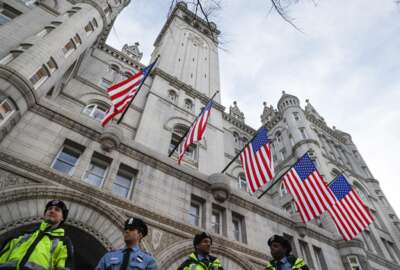 Exclusive
Exclusive House Democrats take Trump administration to court over GSA lease
Members of the House oversight committee say they are entitled to lease information based on the Seven Member Rule.
Subscribe to Federal Drive’s daily audio interviews on iTunes or PodcastOne.
Seventeen members of the House Committee on Oversight and Government Reform on Thursday filed a lawsuit against the General Services Administration, demanding the administrator turn over information related to the Trump Hotel.
In documents filed with the U.S. District Court for the District of Columbia, the congressional members invoked the “Seven Member Rule” and called on the court to order GSA acting Administrator Tim Horne to produce lease information they’ve been requesting since the beginning of the year.
“Following the inauguration of President Trump, GSA’s practice of honoring Seven Member Rule requests changed, but the rationale for the change has been shifting and contradictory,” the lawsuit stated. “As a result of defendant Horne’s failure to produce the information to which plaintiffs are entitled in a timely fashion, plaintiffs are harmed, and continue to be harmed, in a number of ways, including, but not limited to, impedance of the oversight and legislative responsibilities that have been delegated to them by Congress involving government management and accounting measures and the economy, efficiency and management of government operations and activities.”
The Trump administration has 60 days to respond. A request for comment from oversight majority members was not immediately returned.
“This lawsuit is not just about a hotel in Washington, D.C.,” said Rep. Elijah Cummings (D-Md.), during a Thursday press conference on Capitol Hill to announce the lawsuit. “This is about the president defying a federal statute and denying our ability as members of Congress to fulfill our constitutional duty to serve as a check on the executive branch.”
Seven Member Rule
At issue is whether or not Trump is in violation of a $180 million lease between GSA and the Trump Old Post Office LLC.
GSA awarded the 60-year lease to the Trump organization in 2013, and the Trump Hotel opened in September 2016.
“President Trump has refused to divest his ownership interest in the Trump Old Post Office LLC, even though the lease explicitly prohibits any ‘elected official of the government of the United States’ from taking or sharing in any benefit that ‘may arise’ from the lease,” the lawsuit stated. “President Trump’s refusal to divest his ownership interest in a company that contracts with the federal government raises numerous issues requiring congressional oversight of GSA’s interpretation of the contract requirements, and oversight of GSA’s ongoing management of the lease.”
Rep. Eleanor Holmes Norton (D-D.C.), whose name is also on the lawsuit, said her committee is obligated to conduct oversight to ensure the Trump organization lives up to its contract.
“The point of this hotel, as far as the federal government is concerned … is to raise revenue for the federal government,” said Norton, who joined Cummings and other committee members at the press conference.
Several of the members stressed the fact that the hotel building is federal property, and that property is owned by a federal agency.
“This administration will not answer our questions or our requests,” said Rep. Brenda Lawrence (D-Mich.). “We also don’t know what federal agencies are doing to comply with the laws and the regulations of our great country.”
The beginning of the back and forth between Democrat lawmakers and the Trump administration started in December, when 11 oversight committee members sent a letter to GSA asking for information on the Old Post Office under the “Seven Member Rule.”
The rule directs that an agency “shall submit” information requested of it by seven members of the oversight committee.
In early January GSA produced the requested documents in unredacted form “consistent with the Seven Member Rule.” The documents included information on the hotel’s monthly income statements and budget estimates.
In late January, members asked GSA for more information on the lease, and GSA responded it would provide the information under the Seven Member Rule. Eight members replied with their request, however, the lawsuit stated, “GSA did not respond.”
Lawmakers sent two additional letters, but in July, GSA’s Horne denied their information request, saying the agency would only respond to a request from a committee, subcommittee, or committee chairman.
“GSA’s refusal to comply … following the president’s inauguration was a drastic departure from its position taken on Jan. 3, 2017, and illustrates the need for Congress to conduct oversight of GSA’s ability to manage a lease with the president,” court documents stated.
“We don’t want agencies just to feel that … when Congress asks for documents to do our job, they can just say, ‘Oh, the hell with you,'” Cummings said.
According to information provided by minority members, if the court sides in the lawmakers’ favor, it could order GSA to produce the documents.
If GSA refuses, the court could hold the agency in contempt. The court could also impose penalties directly against Horne.
“What we’re looking for is facts, we’re not looking for a fight,” said Rep. Mark DeSaulnier (D-Calif.). “We’re looking for the facts, and then let the committee, the Congress, and the American people judge for themselves whether there’s something amiss here. And the courts will decide that as well.”
The committee members are represented by Georgetown University law professor David Vladeck, who also served as director of the Federal Trade Commission’s Bureau of Consumer Protection, and director of the Public Citizen Litigation Group.
Vladeck is taking on the case pro bono.
GSA IG reviewing lease
House members aren’t the only ones scrutinizing the GSA lease. Federal News Radio was the first to report that GSA’s Office of Inspector General was reviewing the lease between the agency and the Trump organization.
Both GSA and its IG have offered few details, with the agency simply stating it welcomed the oversight and will work with the OIG during the evaluation, and the OIG only confirming the review and declining to comment because “we do not discuss ongoing projects,” an IG spokeswoman said in August.
Copyright © 2025 Federal News Network. All rights reserved. This website is not intended for users located within the European Economic Area.
Related Stories





